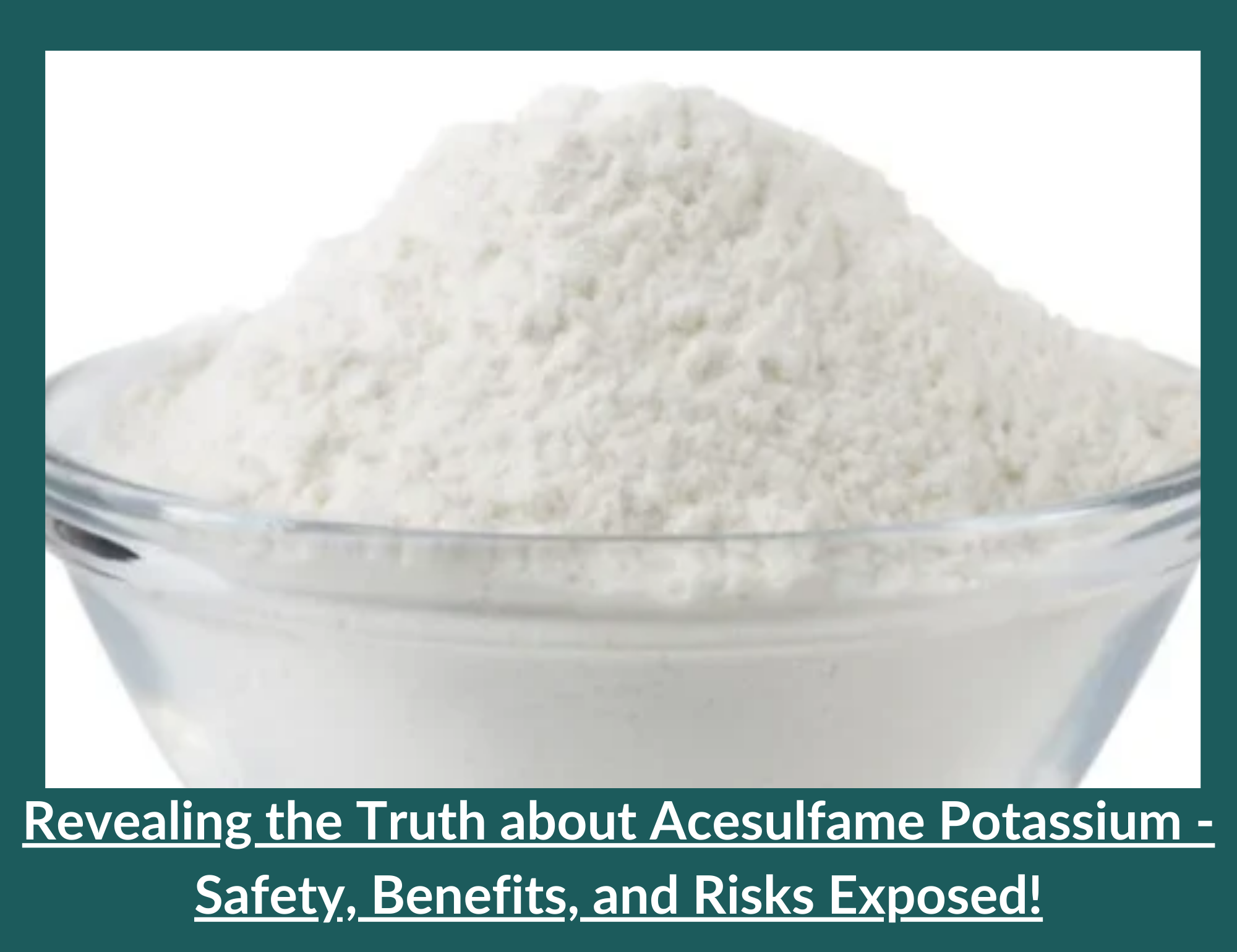Acesulfame potassium is a non-nutritive, high-intensity artificial sweetener used in various food and beverage products. Its intense sweetness, coupled with its stability under a wide range of processing conditions, has made it a popular choice for manufacturers seeking to reduce the caloric content of their products.
While it is generally considered safe for consumption by regulatory agencies, concerns have been raised regarding its potential health risks and toxicity.
This article provides a comprehensive overview of the safety and toxicity of acesulfame potassium, highlighting its benefits and risks.
Health Benefits of Acesulfame Potassium
Acesulfame potassium has several benefits, including:

- Low Calorie: Acesulfame potassium is a non-nutritive sweetener with zero calories. Making it an attractive option for individuals looking to reduce their caloric intake and manage their weight.
- Stability: Acesulfame potassium is highly stable under various processing conditions, including high temperatures and pH levels. This ability makes it a suitable choice for use in various food and beverage products.
- Tooth-Friendly: Acesulfame potassium is non-cariogenic and does not promote tooth decay. Making it a useful sweetener in oral hygiene products like toothpaste and mouthwash.
Potential Health Risks and Toxicity
Despite its widespread use and approval by regulatory agencies, concerns have been raised about the potential health risks and toxicity of acesulfame potassium. Some of the potential health risks associated with acesulfame potassium include:
- Metabolic Effects: Some studies have suggested that acesulfame potassium may have metabolic effects, including glucose metabolism and insulin secretion alterations. However, these effects have yet to be consistently observed across all studies.
- Possible Allergic Reactions: A small number of individuals may have an allergic reaction to acesulfame potassium, resulting in symptoms like hives, itching, and difficulty breathing.
Regulatory Status
Acesulfame potassium is approved as a food additive in the United States by the FDA and in the European Union by the European Food Safety Authority (EFSA). The Acceptable Daily Intake (ADI) for acesulfame potassium is 15 mg/kg of body weight by the FDA and EFSA.

While acesulfame potassium is generally considered safe for consumption, concerns about its potential health risks and toxicity have been raised. Some animal studies have suggested that it may be a carcinogen, and some individuals may experience allergic reactions.
However, human studies have not found any evidence to support these claims. As with any food additive, acesulfame potassium should be consumed in moderation and as part of a balanced diet.
Procure your Acesulfame Potassium hassle-free with EasyBuy – the ultimate solution for food ingredient manufacturers!
Our platform is designed to make your purchasing experience seamless and convenient. With just a few clicks, you can browse our extensive selection of products, compare prices, and choose the best deals that fit your budget. We work with trusted suppliers to ensure the quality and authenticity of our products, so you can have peace of mind knowing you’re getting reliable ingredients for your food manufacturing needs.
Start shopping now and simplify your procurement process with EasyBuy!
Citations:
- Magnuson BA, Burdock GA, Doull J, et al. Aspartame: a safety evaluation based on current use levels, regulations, and toxicological and epidemiological studies. Crit Rev Toxicol. 2007;37(8):629-727. doi: 10.1080/10408440701516184
- Roberts A, Renwick AG, Sims J, Snodin DJ. Sucralose metabolism and pharmacokinetics in man. Food Chem Toxicol. 2000;38 Suppl 2:S31-S41. doi: 10.1016/s0278-6915(00)00025-3
- Schiffman SS, Rother KI. Sucralose, a synthetic organochlorine sweetener: overview of biological issues. J Toxicol Environ Health B Crit Rev. 2013;16(7):399-451. doi: 10.1080/10937404.2013.842523
- Joint FAO/WHO Expert Committee on Food Additives (JECFA). Safety evaluation of certain food additives and contaminants. World Health Organization; 2000.
- European Food Safety Authority. Scientific Opinion on the re-evaluation of aspartame (E 951) as a food additive. EFSA Journal. 2013;11(12):3496. doi: 10.2903/j.efsa.2013.3496
- US Food and Drug Administration. High-intensity sweeteners. Accessed October 2021. https://www.fda.gov/food/food-additives-petitions/high-intensity-sweeteners








